Relationship Anarchy
What is Relationship Anarchy?
Relationship Anarchy is a term coined by Andie Nordgren in a pamphlet in 2006. I recommend you read it first, as I won’t be covering it in-depth here.
I will quote the first tenet of the relationship anarchist, because it feel it is what speaks best to what it is and why a person would desire it.
Love is abundant, and every relationship is unique
“Relationship anarchy questions the idea that love is a limited resource that can only be real if restricted to a couple. You have capacity to love more than one person, and one relationship and the love felt for that person does not diminish love felt for another. Don’t rank and compare people and relationships — cherish the individual and your connection to them. One person in your life does not need to be named primary for the relationship to be real. Each relationship is independent, and a relationship between autonomous individuals.”
Relationship Anarchy is, at face value, exactly what it sounds like. A combination of the terms “Relationship” and “Anarchy” or the application of anarchist principles to intimate relationships. It gets deeper than that though and I’d like to discuss each of the values that this relationship style might include.
According to Wikipedia Relationship Anarchy includes these values and characteristics:
- Autonomy
- Anti-Hierarchical Practices
- Lack of State Control
- Anti-Normativity
- Community Interdependence
- Anti-Amatonormative
- Anti-Mononormative
- Commonly Non-Monogamous
Let’s look at each element closer.
Autonomy
Autonomy is defined as “the capacity of a rational individual to make an informed, un-coerced decision; or, in politics, self-government.”
We are all the rulers of our own world and as individuals, we must make decisions on a daily basis. Autonomy means that we make those decisions informed and un-coerced. We govern ourselves.
I definitely check this box. Autonomy is important to me. I want to be the one to decide what it is I do at any given moment.
Anti-Hierarchical Practices
Relationship anarchists reject hierarchical practices. In life, many people will rank their relationships depending on the perceived value of that relationship. For instance, your husband or wife may take priority over a close friend. Relationship Anarchists tend to value intimacy and romance with people at multiple levels and they don’t prioritize any one person over another. They make time for, and value our time with, everyone.
Lack of State Control
I’ll be straight-up honest here… I have no idea what this means. The link on Wikipedia isn’t much help and the relationship anarchy resources online don’t do the best job of explaining it. I’m going to go out on a limb here and assume that this value has to do with self-governance. Decisions are made without regard to the legality of such action. An example of this, for me, would be laws that restrict the sexual interactions between two consenting adults, such as sodomy laws.
Anti-Normativity
What is “normal”? In our society “normal” relationships have a particular structure and process. You date people. You fall in love. You get married. You have kids. You grow old together. You find your one person who is your end all and be all and you live out your entire life with them. That’s the ideal standard or model. Normativity means relating to that standard or model.
For instance, you might define yourself as a success or failure based on whether or not you were able to live out your romantic life based on this ideal standard that society has about relationships. Can we all agree that while this may be an amazing life for some, for others is not only not practical, but not possible?
I completely identify with this concept. I feel like ideas like heteronormativity, family values, marriage, monogamy can all add to human suffering, specifically for those who do not match up with the ideal standard.
FACT, some people do not want to have children.
FACT, some people do not want to get married.
FACT, some people prefer to live alone.
FACT, some people enjoy intimate relationships with multiple people.
To say that these people aren’t normal, or to judge them based on an ideal standard is harmful, at best.
I know for a fact that idealism has been harmful in nearly every one of my romantic relationships.
If you are divorced, childless, never married, love being single, non-monogamous, queer, etc. you are just as valuable and just as worthy of love, pleasure, joy, happiness as the next person.
Community Interdependence
Probably one of my favorite aspects of relationship anarchy is the concept of community interdependence, which is simply the fact that all “organisms” within a community depend on each other.
This isn’t just a philosophy, this is a scientific theory. Any time you have a community or society, individuals within that society come to rely upon each other, to some extent, for their own survival. Situations that affect one individual can have an effect on other individuals within that community.
Just sit and take a moment to reflect on everything about this world that you know absolutely nothing about. For instance, could you reinvent the airplane? What about an automobile? Would you know how to build a cell phone? What about a house? Can you write a computer program? Could you reinvent the camera? How many of the plants in your own yard are you able to identify? What about insects? I think it’s pretty safe to say that 99% of human knowledge, while accessible to you, is not currently stored within your memory banks.
You and I rely on other people, BIG TIME!
In relationship anarchy, this concept extends to relationships. You can, and I believe you should get your different needs met by different people.
My ex, J, is the best listener. I think that’s why he was also my longest relationship. No matter what, we were always able to talk to each other. No one knows me as he does. No one could ever replace or substitute the place he holds in my life and in my heart. To hold someone else to that standard would be cruel.
Anti-Amatonormative
Amatonormative is a word used to define the pressure many people feel to prioritize marriage, monogamy, and romance. It is described as “the widespread assumption that everyone is better off in an exclusive, romantic, long-term coupled relationship, and that everyone is seeking such a relationship.” This is a specific type of Anti-Normativity (which was addressed previously). This pressure is particularly felt by people who are asexual, aromantic, and/or non-monogamous.
Relationship Anarchists do not feel (or want to minimize the feeling of) the pressure to prioritize marriage, monogamy, or romantic relationships over other relationships. Relationship anarchists value loving friendships and other non-marital relationships.
Anti-Mononormative
Mononormativity is the assumption that romantic and sexual relationships are only normal between two monogamous partners. Anti-mononormativity is the assumption that romantic and sexual relationships can occur and are normal even when the partners are non-monogamous.
Relationships Anarchists believe that being romantically and sexually monogamous is not the only type of relationship to be had. Many also don’t believe that this is the best standard for relationships.
Non-Monogamous
Due to the previously defined belief systems, many Relationship anarchists are non-monogamous. Non-monogamy encompasses every philosophy of non-dyadic intimate relationships, including extramarital sex, group sex, various forms of polyamory, and swinging.
So, Am I a Relationship Anarchist?
Most definitely. I’m just processing my thoughts after a close friend told me that they think I’m a relationship anarchist. I looked into it and I feel like it definitely fits many of my thoughts and ideas on relationships. I used to claim to be solo poly, but I definitely have an element of not desiring to divert to a person or ask permission before I have an interaction with another person. I am happiest when I am doing what I want to do and spending time with who I want to spend time with. Call me selfish, but spend an hour enveloped in my undivided attention and tell me you don’t want more. Anyway, YOU always have the choice to not participate.
Relationship Anarchists understand that to ask one person to provide for and meet all of their needs is not possible. They deconstruct all the pieces of their relationships (like a partnership, living together, romance, kinks, companionship, sex, conversation, etc.) I find that Relationship Anarchy speaks to me because I have so many people in my life that I love for exactly who they are. I KNOW that there is no possibility of a “normal” relationship for us, and I don’t want one. Normal relationships restrict me. Monogamy makes me depressed. When I’m monogamous I have this horrible habit of expecting my partner to fulfill all my needs and it ends up leaving them feeling exhausted and like they aren’t good enough. After all, I AM a nymphomaniac. The more I have sex, the more I want sex. It’s a vicious cycle. I have so many kinks and so many fetishes and unfulfilled fantasies. I also like to enjoy people for exactly who they are, without the pressure of having to progress the relationship according to someone else’s standards. I only have one life to live. Being intimate with people is something that I enjoy. I’ve learned that when you love people without expectation you are blessed with a glimpse of their true self, untainted by fallacious presentations required for social acceptance. Like a diamond, I am multifaceted. Relationship anarchy speaks to and satisfies my multifaceted nature.
The image gallery for this page is about relationship anarchy and polyamory. (Relationship Anarchy is a form of polyamory.) I hope you find the resources helpful.



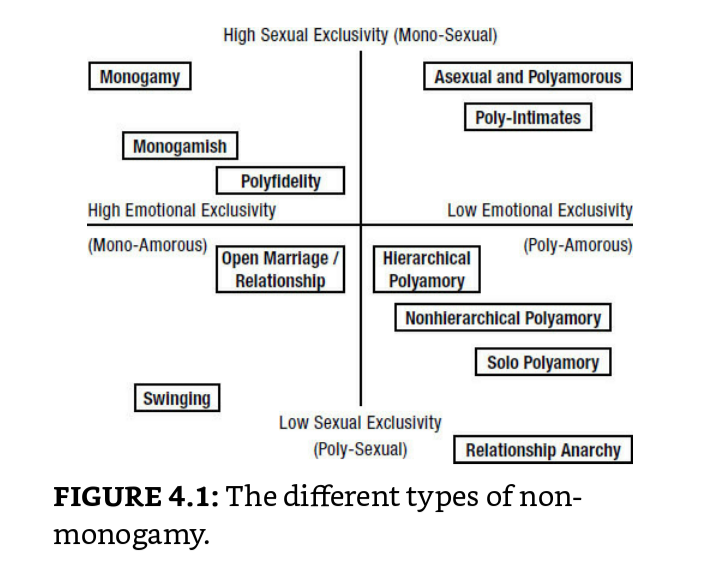
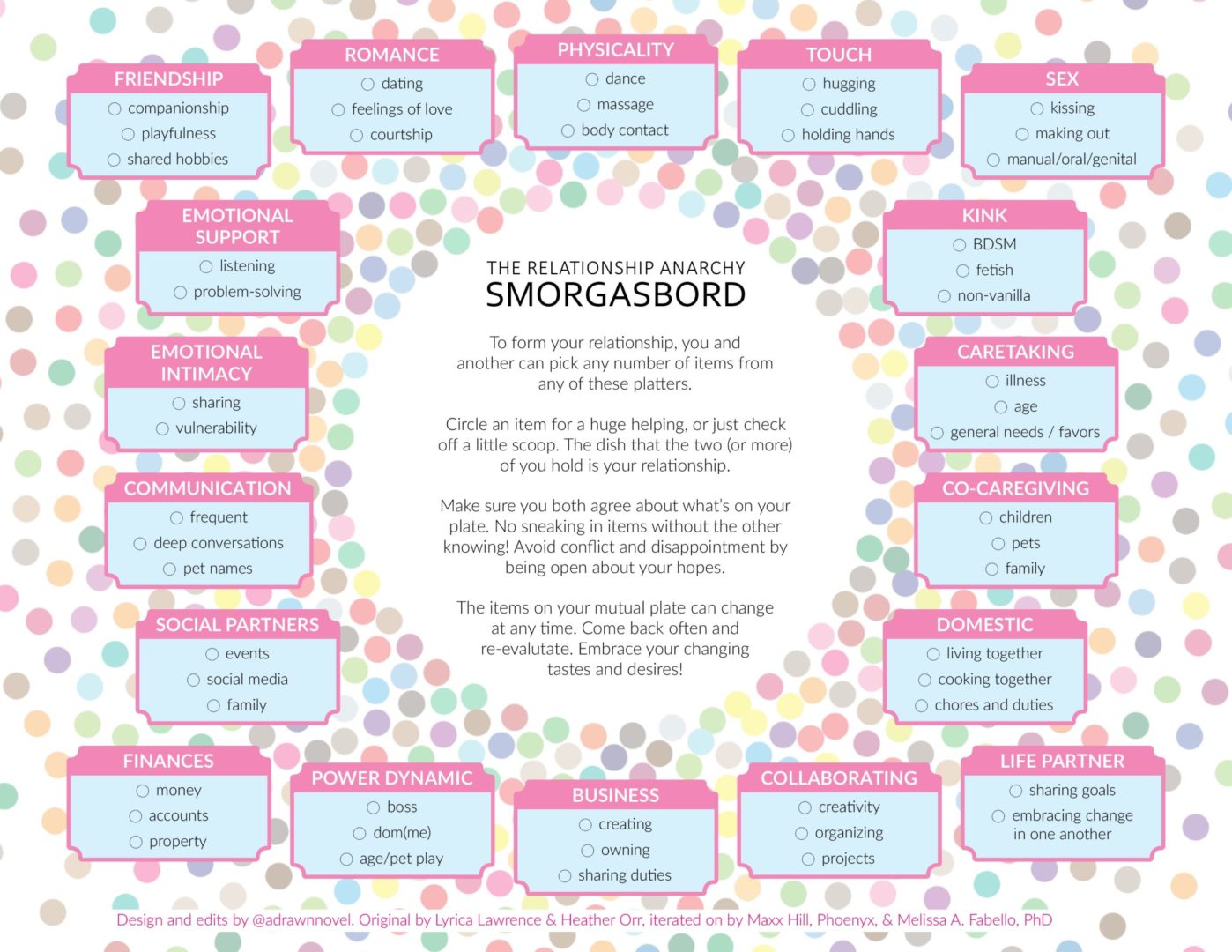
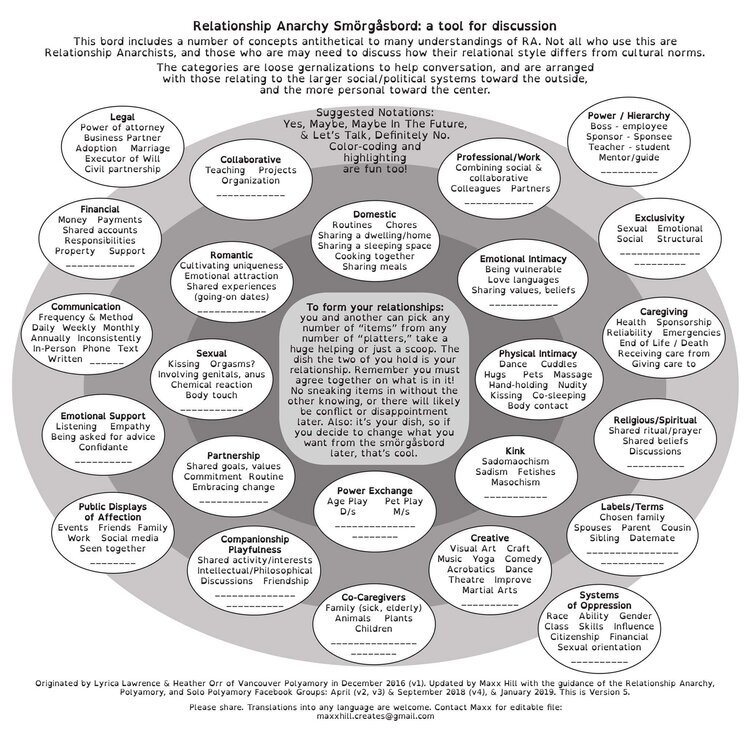
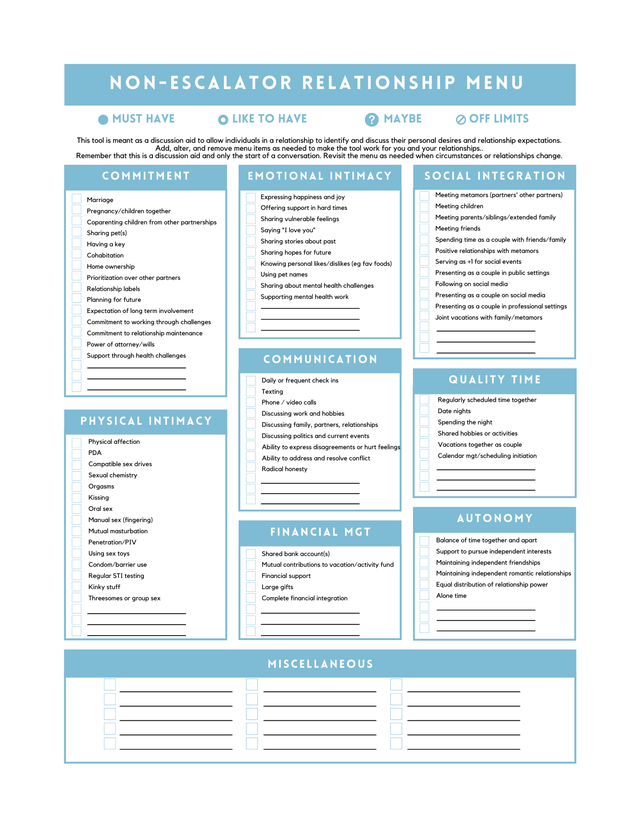
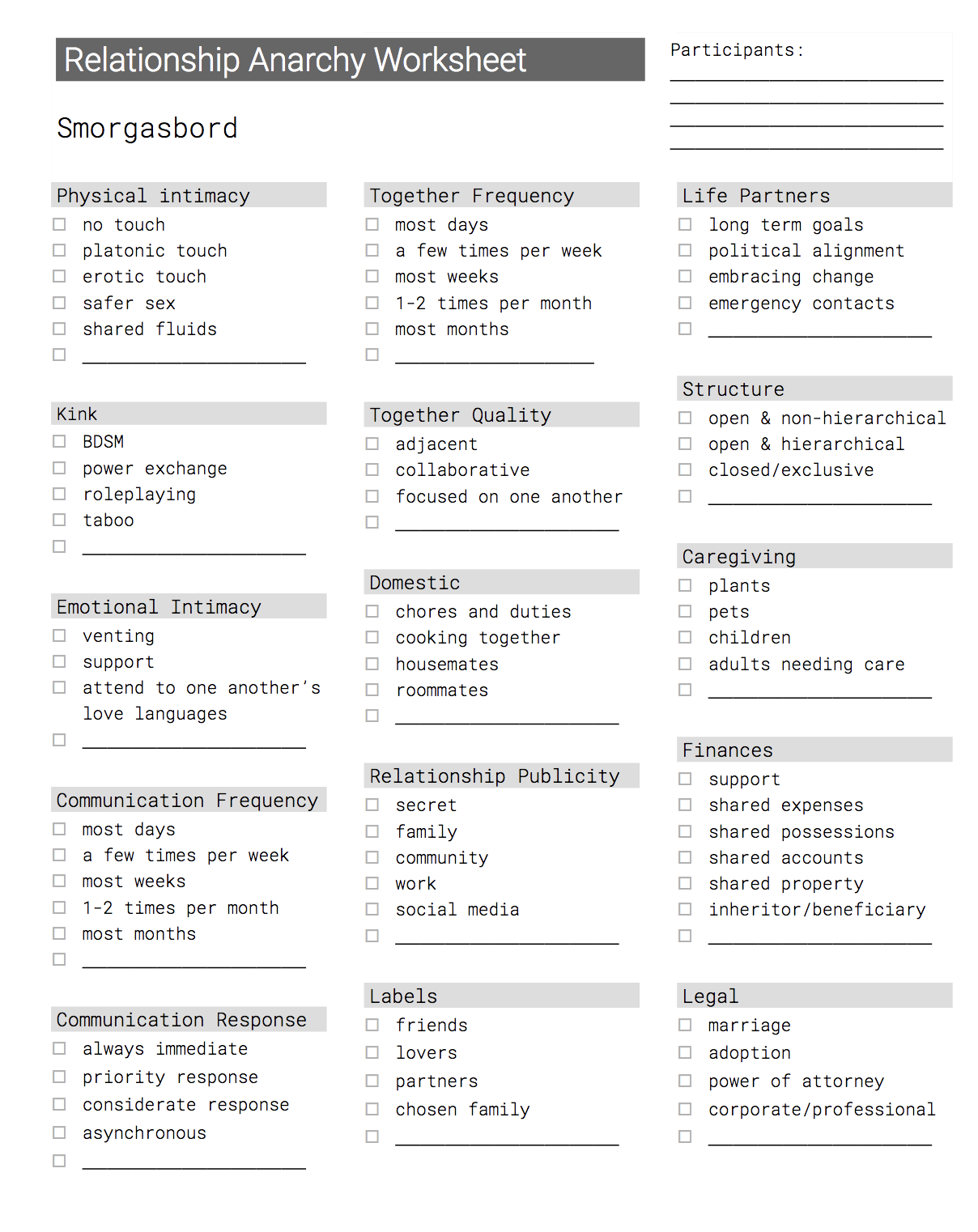
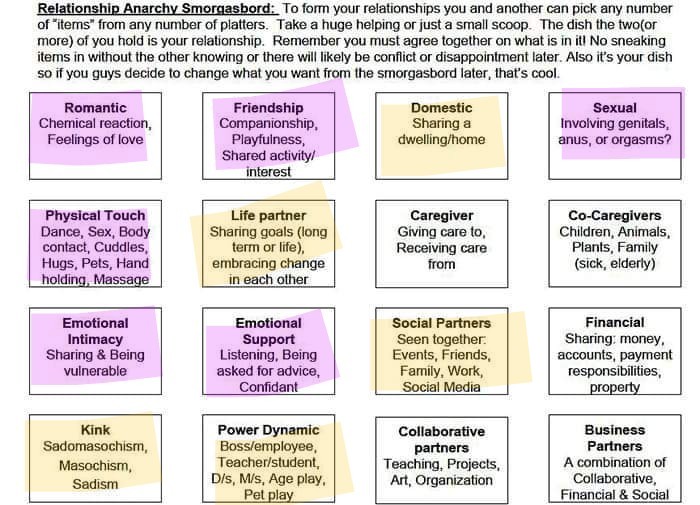

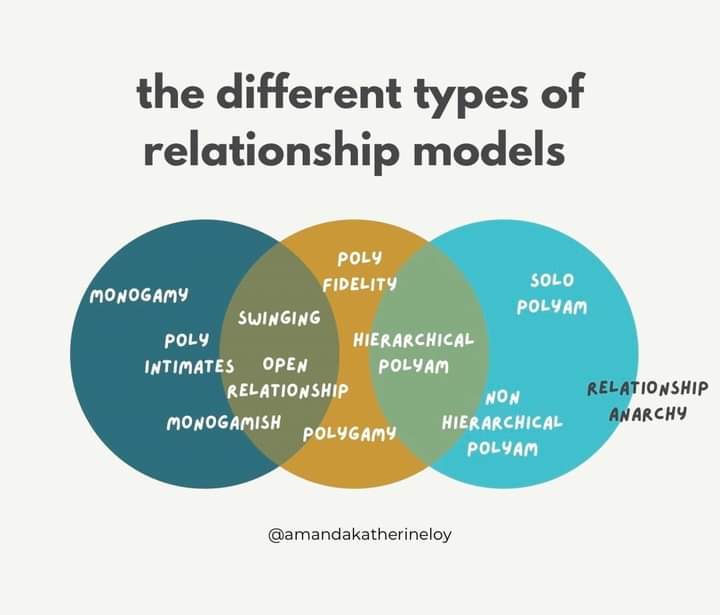

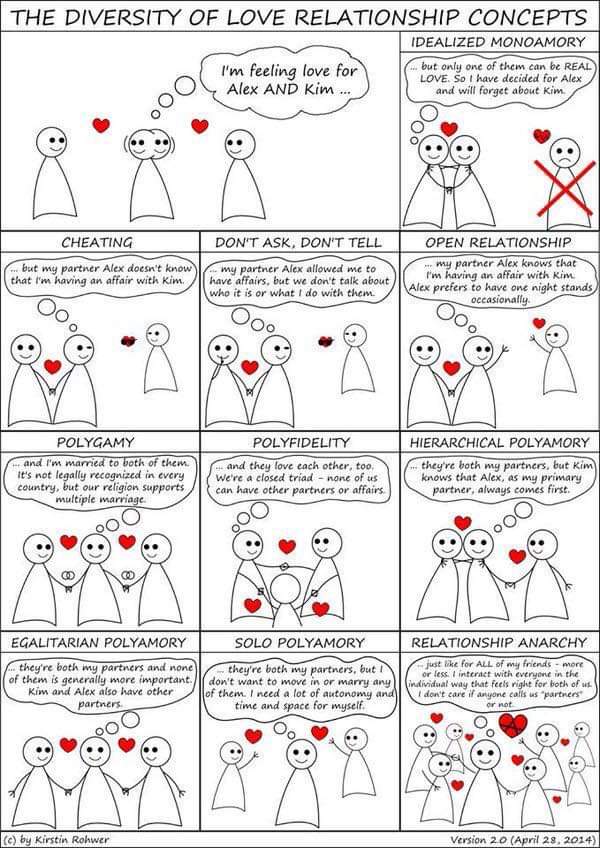
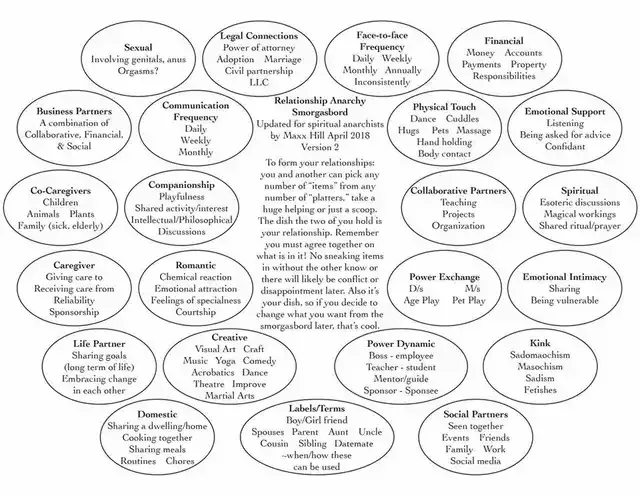

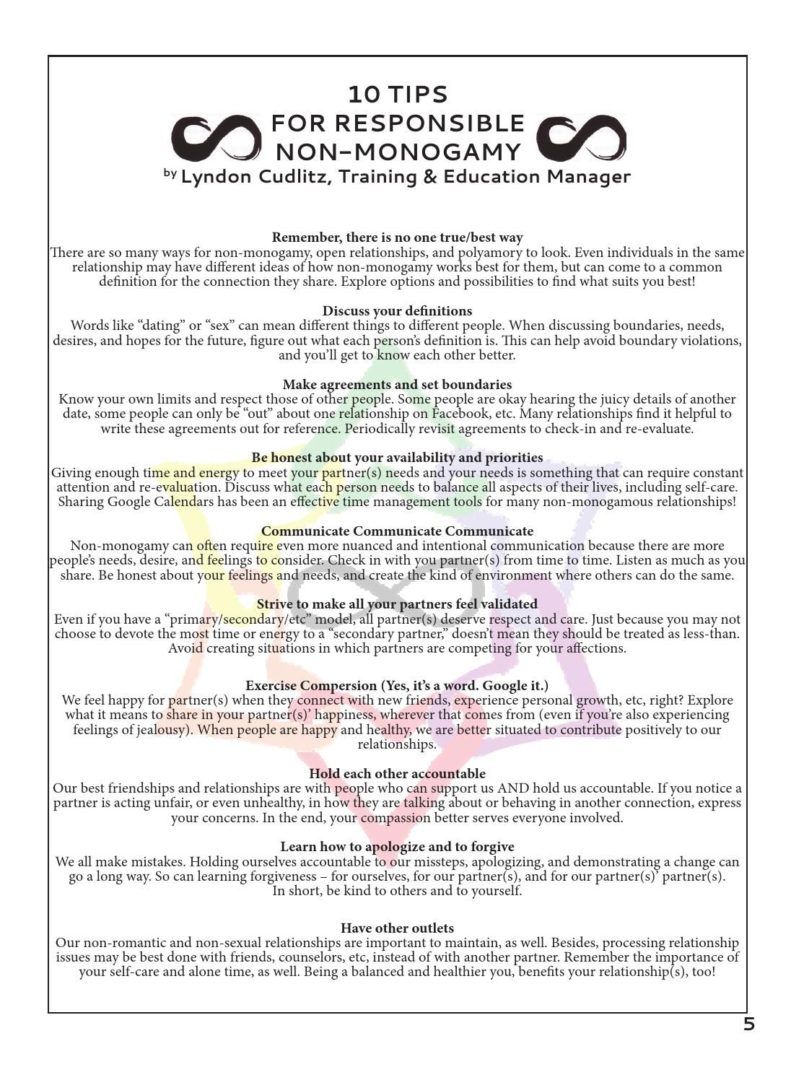
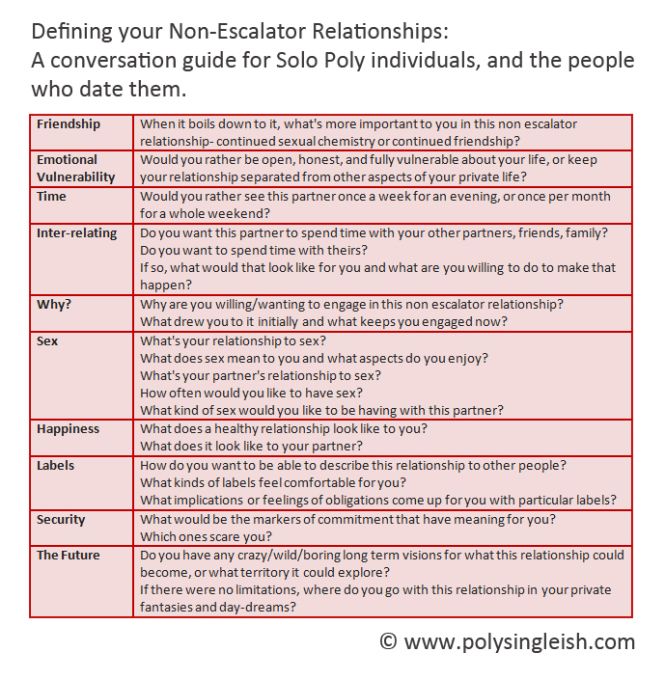

0 Comments